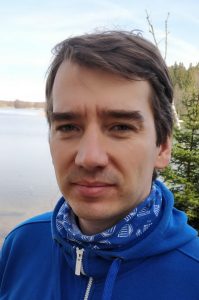Young Scientist Awardee: Velle Toll, Estonia
The EMS Young Scientist Award 2020 will be presented to Velle Toll, University of Tartu, Estonia, nominated with the publication: “Weak average liquid-cloud-water response to anthropogenic aerosols”, V. Toll, M. Christensen, J. Quaas, N. Bellouin, Nature (2019), https://doi.org/10.1038/s41586-019-1423-9.

Velle Toll receives the award for his work that significantly improved the understanding of the anthropogenic air pollution particles, clouds and climate. The findings rely on a novel analysis of the properties of polluted clouds downwind of variety of anthropogenic air pollution sources using MODIS satellite data. These findings invalidate the hypothesis that increases in cloud water cause a substantial climate cooling effect and translate into reduced uncertainty in projections of future climate.
Velle Toll’s field of primary research covers aerosol climate forcing, aerosol-cloud interactions, atmospheric remote sensing and climate change.
Short biography
Velle Toll received his PhD in Atmospheric Physics in 2016 from the University of Tartu, Estonia. His thesis topic was “Direct radiative impacts of atmospheric aerosols on meteorological conditions over Europe”.
From 2012 to 2015 he was a research assistant at the University of Tartu, Institute of Physics, Department of Atmospheric Physics, and working for the Estonian Environment Agency, Department of Numerical Modelling as a NWP model developer. After two years at the Department of Meteorology at the University of Reading doing postdoctoral climate research, he returned to the Department of Atmospheric Physics at the University of Tartu as a researcher. He has also been teaching various subjects in atmospheric sciences at the University of Tartu since 2015.
Participation in research projects
- Pollution tracks in clouds help to understand anthropogenic impacts on Earth’s climate. Principle Investigator, personal research funding start-up grant from the Estonian Research Council.
- Use of remote sensing data for elaboration and development of public services. Funded by the Estonian Research Council.
- Project VOLCCANO (Volcanoes for constraining aerosol-cloud interactions) funded by the University of Reading, UK. Supervised by Dr Nicolas Bellouin.
- Airborne nanoparticles and their role in meteorological processes. Institutional research grant IUT20-11 from the Estonian Research Council.
- Substitute member of the management committee of the COST Action ES1004. European framework for online integrated air quality and meteorology modelling.
- HIRLAM-B program http://hirlam.org/
- Numerical modelling of derecho dynamics in Baltic Sea region. Research grant No 9140 from the Estonian Science Foundation.
- Development of the Numerical Weather Prediction Towards the Forecasting of Atmospheric Environment. Targeted Funding project SF0180038s08. Financed by the Estonian Ministry of Education and Research.
Awards
- First prize in the category of natural sciences and technology at the PhD level in the 2016 Estonian national science contest for university students.
Award presentation
The Award was planned to be presented at the EMS Annual Meeting in Bratislava in September, with Velle giving an award lecture. Due to the COVID-19 pandemic, the Awards Ceremony arranged to honour the 2020 Young Scientist Awardee and the 2020 Silver Medallist, took place on 1 June 2021 at a virtual ceremony.


Kommentare sind geschlossen.